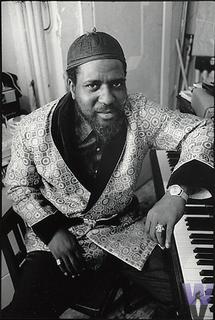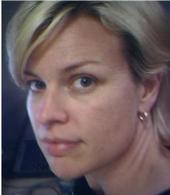Poor Conversationalists = Free Jazz Musicians
I have little patience for people that:
a) talk too much
b) interrupt conversations without sufficient reason (sufficient = some piece of information that benefits all participants of the conversation)
c) don't listen to or ask questions of others
d) monopolize conversations
e) use speaking volume and aggression to bully in conversation
For those that are guilty of such behavior the conversational elitist in me says "your mama didn't raise you right".
Playing in bands can be the ultimate in group communication; it's a panacea for a conversational elitist like me. Most forms of music employ structures that provide cues for when things are supposed to happen and perhaps most importantly a foundation for things *to happen*. There's a safety that forms provide creating an artistic environment in which participants can relax, listen and rely on the consistency of the form's structure while they focus on their role within the ensemble and how they contribute to the overall musical creation.
Take for example a jazz quartet (piano,bass,drums and sax) playing jazz standards or bop heads; most likely the sax player will perform the melody while the piano comps chord changes, the bass outlines the chord progression and rhythmic patterns while the drummer keeps time. The tune itself most likely uses the AABA form or some variation thereof. Once the melody has been played the tune will open up for solos over the form of the tune and there will be some designation as to who will solo when. There may also be 4s traded - this is type of call and response solo in which musicians trade solos after playing for 4 bars.
The statement of the melody over chord changes sets the context of the musical conversation and focuses both musicians and listeners - it says "this is why we're here and we are all in agreement about why we're here, this is the ground we're going to cover while we're here and this is the context in which it will be expressed". It's all quite lovely and simple.
Solo time comes and new ideas are introduced, we get to listen to each musicians point of view over that well established context.
After the solos there maybe a restatement of the melody and this serves as an affirmation and recapitulation of not only the fundamental ideas express within the structure of the song but also the interpretation that's occured during the solo section hopefully encompassing the artistic upshot of the solo section.
It's all very lovely - we have a conversational topic and opinions of individuals that get expressed not only in a civil fashion but in such a way that they contribute to a greater artistic good that all can enjoy and benefit from. What pleasure!
I'd say that it wouldn't be unreasonable to compare a good conversationalist to a good modern jazz musician.
Poor conversationalists on the other hand . . . . maybe they are just free jazz musicians at heart?
Do a quick wikipedia lookup on 'free jazz' and here's what you get:
http://en.wikipedia.org/wiki/Free_jazz
"Typically this kind of music is played by small groups of musicians. In popular perception, free jazz is loud, aggressive, dissonant and in general full of sound and fury. Many critics, particularly at the music's inception, suspected that the abandonment of familiar elements of jazz pointed to a lack of technique on the part of the musicians. Most free jazz musicians use overblowing techniques or otherwise elicit unconventional sounds from their instruments. Today such views are more marginal, and the music has built up a tradition and a body of accompanying critical writing. It remains less commercially popular than most other forms of jazz."
Interesting - let's take this apart a bit - I often judge poor conversationalist as "loud, aggressive, dissonant and in general full of sound and fury". Characterizing their conversational contributions as rife with "overblowing" seems appropriate. And most certainly, in my infinite conversational wisdom, would view them as having a 'lack of technique'.
But if I label poor conversationalists as free jazz musicians am I giving them too much credit?!
I have little patience for people that:
a) talk too much
b) interrupt conversations without sufficient reason (sufficient = some piece of information that benefits all participants of the conversation)
c) don't listen to or ask questions of others
d) monopolize conversations
e) use speaking volume and aggression to bully in conversation
For those that are guilty of such behavior the conversational elitist in me says "your mama didn't raise you right".
Playing in bands can be the ultimate in group communication; it's a panacea for a conversational elitist like me. Most forms of music employ structures that provide cues for when things are supposed to happen and perhaps most importantly a foundation for things *to happen*. There's a safety that forms provide creating an artistic environment in which participants can relax, listen and rely on the consistency of the form's structure while they focus on their role within the ensemble and how they contribute to the overall musical creation.
Take for example a jazz quartet (piano,bass,drums and sax) playing jazz standards or bop heads; most likely the sax player will perform the melody while the piano comps chord changes, the bass outlines the chord progression and rhythmic patterns while the drummer keeps time. The tune itself most likely uses the AABA form or some variation thereof. Once the melody has been played the tune will open up for solos over the form of the tune and there will be some designation as to who will solo when. There may also be 4s traded - this is type of call and response solo in which musicians trade solos after playing for 4 bars.
The statement of the melody over chord changes sets the context of the musical conversation and focuses both musicians and listeners - it says "this is why we're here and we are all in agreement about why we're here, this is the ground we're going to cover while we're here and this is the context in which it will be expressed". It's all quite lovely and simple.
Solo time comes and new ideas are introduced, we get to listen to each musicians point of view over that well established context.
After the solos there maybe a restatement of the melody and this serves as an affirmation and recapitulation of not only the fundamental ideas express within the structure of the song but also the interpretation that's occured during the solo section hopefully encompassing the artistic upshot of the solo section.
It's all very lovely - we have a conversational topic and opinions of individuals that get expressed not only in a civil fashion but in such a way that they contribute to a greater artistic good that all can enjoy and benefit from. What pleasure!
I'd say that it wouldn't be unreasonable to compare a good conversationalist to a good modern jazz musician.
Poor conversationalists on the other hand . . . . maybe they are just free jazz musicians at heart?
Do a quick wikipedia lookup on 'free jazz' and here's what you get:
http://en.wikipedia.org/wiki/Free_jazz
"Typically this kind of music is played by small groups of musicians. In popular perception, free jazz is loud, aggressive, dissonant and in general full of sound and fury. Many critics, particularly at the music's inception, suspected that the abandonment of familiar elements of jazz pointed to a lack of technique on the part of the musicians. Most free jazz musicians use overblowing techniques or otherwise elicit unconventional sounds from their instruments. Today such views are more marginal, and the music has built up a tradition and a body of accompanying critical writing. It remains less commercially popular than most other forms of jazz."
Interesting - let's take this apart a bit - I often judge poor conversationalist as "loud, aggressive, dissonant and in general full of sound and fury". Characterizing their conversational contributions as rife with "overblowing" seems appropriate. And most certainly, in my infinite conversational wisdom, would view them as having a 'lack of technique'.
But if I label poor conversationalists as free jazz musicians am I giving them too much credit?!


